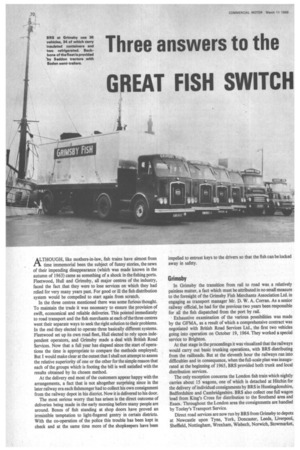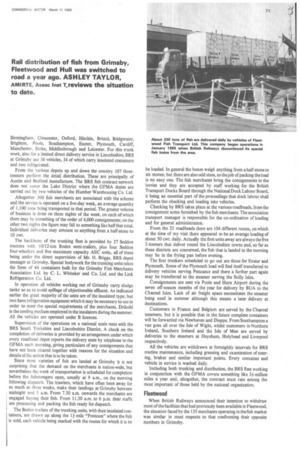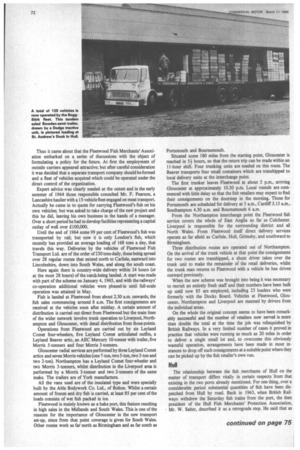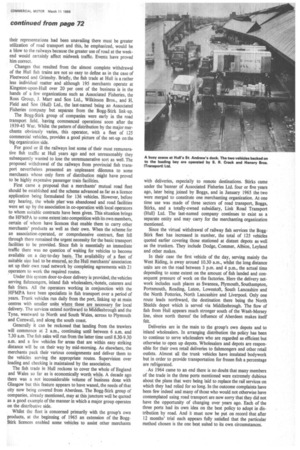Three answers to the
Page 72

Page 73

Page 74

Page 77

If you've noticed an error in this article please click here to report it so we can fix it.
GREAT FISH SWITCH
ATHOUGH, like mothers-in-law, fish trains have almost from time immemorial been the subject of funny stories, the news of their impending disappearance (which was made known in the autumn of 1963) came as something of a shock in the fishing ports. Fleetwood, Hull and Grimsby, all major centres of the industry, faced the fact that they were to lose services on which they had relied for very many years past. For good or ill the fish distribution system would be compelled to start again from scratch.
In the three centres mentioned there was some furious thought. To maintain the trade it was necessary to ensure the provision of swift, economical and reliable deliveries. This pointed immediately to road transport and the fish merchants at each of thethre,e centres went their separate ways to seek the right solution to their problems. In the end they elected to operate three basically different systems. Fleetwood set up its own road fleet, Hull elected to rely upon independent operators, and Grimsby made a deal with British Road Services. Now that a full year has elapsed since the start of operations the time is appropriate to compare the methods employed; But I would make clear at the outset that! shall not attempt to assess the relative superiority of one or the other for the simple reason that each of the groups which is footing the bill is well satisfied with the results obtained by its chosen method.
At the delivery end most of the customers appear happy with the arrangements, a fact that is not altogether surprising since in the later railway era each fishmonger had to collect his own consignment from the railway depot in his district. Now it is delivered to his door.
The most serious worry that has arisen is the direct outcome of deliveries being made in the early morning before many people are around. Boxes of fish standing at shop doors have proved an irresistible temptation to light-fingered gentry in certain districts. With the co-operation of the police this trouble has been kept in check and at the same time more of the shopkeepers have been impelled to entrust keys to the drivers so that the fish can be locked away in safety.
Grimsby In Grimsby the transition from rail to road was a relatively painless matter, a fact which must be attributed in no small measure to the foresight of the Grimsby Fish Merchants Association Ltd. in engaging as transport manager Mr. D. W. A. Corran. As a senior railway official, he had for the previous two years been responsible for all the fish dispatched from the port by rail.
Exhaustive examination of the various possibilities was made by the GFM A, as a result of which a comprehensive contract was negotiated with British Road Services Ltd., the first two vehicles going into operation on October 19, 1964. They worked a special service to Brighton.
At that stage in the proceedings it was visualized that the railways would carry out basic trunking operations, with BRS distributing from the railheads. But at the eleventh hour the railways ran into difficulties and in consequence, when the full-scale plan was inaugurated at the beginning of 1965, BRS provided both trunk and local distribution services.
The only exception concerns the London fish train which nightly carries about 15 wagons, one of which is detached at Hitchin for the delivery of individual consignments by BRS in Huntingdonshire, Bedfordshire and Cambridgeshire. BRS also collect one full wagon load from King's Cross for distribution to the Southend area and Essex. Throughout the London area the consignments are handled by Tooley's Transport Service.
Direct road services are now run by BRS from Grimsby to depots at Newcastle upon Tyne, York, Doncaster, Leeds, Liverpool, Sheffield, Nottingham, Wrexham, Wisbech, Norwich, Stowinarket, Birmingham, Gloucester, Oxford, Hitchin, Bristol, Bridgwater, Brighton. Poole, Southampton, Exeter, Plymouth, Cardiff, Manchester, Stoke, Middlesbrough and Leicester. For this trunk work, also for a limited direct delivery service in Lincolnshire, BRS at Grimsby use 36 vehicles, 34 of which carry insulated containers and two refrigerated.
From the various depots up and down the country 107 threetonners perform the detail distribution. These are principally of Austin and Bedford manufacture. The BRS fish contract network does not cover the Lake District where the GFMA duties are carried out by two vehicles of the Humber Warehousing Co. Ltd.
Altogether 360 fish merchants are associated with the scheme and the service is operated on a five-day week, an average quantity of 1,100 tons being transported in that period. The greater volume of business is done on three nights of the week, on each of which there may be something of the order of 4,000 consignments; on the other two nights the figure may fall to something like half that total. Individual deliveries may amount to anything from a half-stone to 10 cwt.
The backbone of the trunking fleet is provided by 27 Seddon tractors with 10/12-ton Boden semi-trailers, plus four Seddon four-wheelers and five maximum capacity AEC units, all of these being under the direct supervision of Mr. H. Briggs, BRS depot manager at Grimsby. Special bodywork for the trunking units takes the form of 46 containers built for the Grimsby Fish Merchants Association Ltd. by C. L. Whitaker and Co. Ltd. and the Link Refrigeration Co. Ltd.
In operation all vehicles working out of Grimsby carry sludge tanks so as to avoid spillage of objectionable effluent. As indicated earlier the great majority of the units are of the insulated type; but two have refrigeration equipment which it may be necessary to use in order to meet the special requirements of the merchants. Drikold is the cooling medium employed in the insulators during the summer. All the vehicles are operated under B licences.
Supervision of the operations on a national scale rests with the BRS South Yorkshire and Lincolnshire District. A check on the completion of deliveries is provided by an arrangement under which every roadhead depot reports the delivery state by telephone to the GFMA each morning, giving particulars of any consignments that have not been cleared together with reasons for the situation and details of the action that is to be taken.
Since most varieties of fish are landed at Grimsby it is not surprising that the demand on the merchants is nation-wide, but nevertheless the work of transportation is scheduled for completion before the fishmongers open, usually at 9 a.m., on the morning following dispatch. The trawlers, which have often been away for as much as three weeks, make their landings at Grimsby between midnight and 5 a.m. From 7.30 a.m. onwards the merchants are engaged buying their fish. From 11.30 a.m. to 6 p.m. their staffs are processing and packing the fish ready for dispatch.
The Boden trailers of the trunking units, with their insulated containers, are drawn up along the 1-1-mile "Pontoon" where the fish is sold, each vehicle being marked with the routes for which it is to
be loaded. In general the boxes weigh anything from a half stone to six stones; but there are also odd sizes, so the job of packing the load is no easy one. The fish merchants bring the consignments to the lorries and they are accepted by staff working for the British Transport Docks Board through the National Dock Labour Board, it being an essential part of the proceedings that dock labour shall perform the checking and loading into vehicles.
Checking by BRS takes place at the various roadheads, from the consignment notes furnished by the fish merchants. The association transport manager is responsible for the co-ordination of loading and for general administration.
From the 25 roadheads there are 104 different routes, on which at the time of my visit there appeared to be an average loading of about 30 cwt. daily. Actually the first units away are always the five 3-tonners that deliver round the Lincolnshire towns and, so far as these districts are concerned, the fish that is landed in the morning may be in the frying pan before evening.
The first trunkers scheduled to go out are those for Exeter and Plymouth. Some of the Plymouth load will find itself transferred to delivery vehicles serving Penzance and there a further part again may be transferred to the steamer serving the Scilly Isles.
Consignments are sent via Poole and Hum Airport during the seven off-season months of the year for delivery by BUA to the Channel Isles. Lack of air freight space necessitates the steamer being used in summer although this means a later delivery at destinations.
Customers in France and Belgium are served by the Channel steamers; but it is possible that in the future complete containers will be forwarded via Newhaven and Dieppe. From Southampton a van goes all over the Isle of Wight, whilst customers in Northern Ireland, Southern Ireland and the Isle of Man are served by deliveries to the steamers at Heysham, Holyhead and Liverpool respectively.
All the vehicles are withdrawn at fortnightly intervals for BRS routine maintenance, including greasing and examination of steering, brakes and similar important points. Every container and vehicle in service is washed daily.
Including both trunking and distribution, the BRS fleet working in conjunction with the GFMA covers something like 34---million miles a year and, altogether, the contract must rate among the most important of those held by the national organization.
Fleetwood
When British Railways announced their intention to withdraw most of the facilities that had previously been available in Fleetwood, the situation faced by the 135 merchants operating in the fish market was similar in most respects to that confronting their opposite numbers in Grimsby. Thus it came about that the Fleetwood Fish Merchants' Association embarked on a series of discussions with the object of formulating a policy for the future. At first the employment of outside carriers appeared attractive; but after careful consideration it was decided that a separate transport company should be formed and a fleet of vehicles acquired which could be operated under the direct control of the organization.
Expert advice was clearly needed at the outset and in the early summer of 1964 those responsible consulted Mr. F. Pearson, a Lancashire haulier with a 15-vehicle fleet engaged on meat transport. Actually he came in to quote for carrying Fleetwood's fish on his own vehicles; but was asked to take charge of the new project and this he did, leaving his own business in the hands of a manager. Over a short period he had to develop facilities representing a capital outlay of well over £100,000.
Until the end of 1964 some 99 per cent of Fleetwood's fish was transported by rail; but now it is only London's fish, which recently has provided an average loading of 168 tons a day, that travels this way. Deliveries by the vehicles of Fleetwood Fish Transport Ltd. are of the order of 230 tons daily, these being spread over 28 regular routes that extend north to Carlisle, eastward into Lincolnshire, down into South Wales, and along the south coast.
Here again there is country-wide delivery within 24 hours (or at the most 28 hours) of the catch.being landed. A start was made with part of the scheme on January 4, 1965, and with the railways' co-operation additional vehicles were phased-in until full-scale operation was attained in May.
Fish is landed at Fleetwood from about 2.30 a.m. onwards, the fish sales commencing around 8 a.m. The first consignments are received at the vehicles soon after midday. A certain amount of distribution is carried out direct from Fleetwood but the main lines of the wider network involve trunk operation to Liverpool, Northampton and Gloucester, with detail distribution from those points.
Operations from Fleetwood are carried out by six Leyland Comet four-wheelers, five Leyland Comet articulated outfits, a Leyland Beaver artic, an AEC Mercury 10-tonner with trailer, five Morris 5-tonners and four Morris 3-tonners.
Gloucester radial services are performed by three Leyland Comet artics and seven Morris vehicles (one 7-ton, two 5-ton, two 3-ton and two 2-ton). Northampton has a Leyland Comet four-wheeler and two Morris 3-tonners, whilst distribution in the Liverpool area is performed by a Morris 3-tonner and two 2-tanners of the same make. The trailers are of York manufacture.
All the vans used are of the insulated type and were specially built by the Able Bodywork Co. Ltd., of Bolton. Whilst a certain amount of frozen and dry fish is carried, at least 85 per cent of the loads consists of wet fish packed in ice.
Fleetwood is mainly known as a hake port, this feature resulting in high sales in the Midlands and South Wales. This is one of the reasons for the importance of Gloucester in the new transport set-up, since from that point coverage is given for South Wales. Other routes work as far north as Birmingham and as far south as Portsmouth and Bournemouth.
Situated some 180 miles from the starting point, Gloucester is reached in 51 hours, so that the return trip can be made within an 11-hour shift. Four trunking units are needed on this route. The Beaver transports four small containers which are transhipped to local delivery units at the interchange point.
The first trunker leaves Fleetwood at about 5 p.m., arriving Gloucester at approximately 10.30 p.m. Local rounds are commenced with little delay so that the fish retailers may expect to find their consignments on the doorstep in the morning. Those for Portsmouth are scheduled for delivery at 3 a.m., Cardiff 3.15 a.m., Southampton 4.30 a.m. and Bournemouth 6 a.m.
From the Northampton interchange point the Fleetwood fish service covers the whole of East Anglia as far as Colchester. Liverpool is responsible for the surrounding district and all North Wales. From Fleetwood itself direct delivery services operate as far afield as Carlisle, Hull. Grimsby, and southward to Birmingham.
Three distribution routes are operated out of Northampton. On the arrival of the trunk vehicle at that point the consignments for two routes are transhipped, a shunt driver takes over the trunk unit to make the remainder of the retail deliveries, whilst the trunk man returns to Fleetwood with a vehicle he has driven outward previously.
When the new scheme was brought into being it was necessary to recruit an entirely fresh staff and their numbers have been built up until now 85 are employed, including 23 loaders who were formerly with the Docks Board. Vehicles at Fleetwood, Gloucester, Northampton and Liverpool are manned by drivers from the individual areas.
On the whole the original concept seems to have been remarkably successful and the number of retailers now served is more than double the total at the time the job was relinquished by British Railways. In a very limited number of cases it proved in practice that vehicles were running as much as 20 miles in order to deliver a single small lot and, to overcome this obviously wasteful operation, arrangements have been made in most instances to drop off such consignments at a suitable point where they can be picked up by the fish retailer's own van.
Hull
The relationship between the fish merchants of Hull on the matter of transport differs vitally in certain respects from that existing in the two ports already mentioned. For one thing, over a considerable period substantial quantities of fish have been dispatched from Hull by road. Back in 1963, when British Railways withdrew the Saturday fish trains from the port, the then president of the Hull Fish Merchants' Protection Association, Mr. W. Salter, described it as a retrograde step. He said that as their representations had been unavailing there must be greater utilization of road transport and this, he emphasized, would be a blow to the railways because the greater use of road at the weekend would certainly affect midweek traffic. Events have proved him correct.
Changes that resulted from the almost complete withdrawal of the Hull fish trains are not so easy to define as in the case of Fleetwood and Grimsby. Briefly, the fish trade at Hull is a rather less individual matter and although 195 merchants operate at Kingston-upon-Hull over 20 per cent of the business is in the hands of a few organizations such as Associated Fisheries, the Ross Group, J. Marr and Son Ltd., Wilkinson Bros., and H. Field and Son (Hull) Ltd., the last-named being an Associated Fisheries company but separate from the Bogg-Stirk link-up.
The Bogg-Stirk group of companies were early in the road transport field, having commenced operations soon after the 1939-45 War. Whilst the pattern of distribution by the major merchants obviously varies, this operator, with a fleet of 125 commercial vehicles, provides a good picture of the set-up on the big organization side.
For good or ill the railways lost some of their most remunerative fish traffic at Hull years ago and not unreasonably they subsequently wanted to lose the unremunerative sort as well. The proposed withdrawal of the railways from provincial fish transport nevertheless presented an unpleasant dilemma to some merchants whose only form of distribution might have proved to be highly expensive passenger train facilities.
First came a proposal that a merchants' mutual road fleet should be established and the scheme advanced as far as a licence application being formulated for 136 vehicles. However, before any hearing, the whole plan was abandoned and road facilities were set up by the association in co-operation with local operators to whom suitable contracts have been given. This situation brings the HFMPA to some extent into competition with its own members, certain of whom have licences that enable them to carry other merchants' products as well as their own. When the scheme for an association-operated, or comprehensive contract, fleet fell through there remained the urgent necessity for the basic transport facilities to be provided. Since fish is essentially an immediate• traffic there was no question of waiting for vehicles to become available on a day-to-day basis. The availability of a fleet of suitable size had to be ensured, so the Hull merchants' association set up their own road network by completing agreements with 21 operators to work the required routes.
Under this system door-to-door delivery is provided, the vehicles serving fishmongers, inland fish wholesalers,•hotels, caterers and fish friers. All the operators working in conjunction with the HFMPA have been specialists in fish transport over a period of years. Trunk vehicles run daily from the port, linking up at main centres with smaller units where these are necessary for local delivery. The services extend northward to Middlesbrough and the Tyne, westward to North and South Wales, across to Plymouth and Cornwall, and along the south coast.
Generally it can be reckoned that landing from the trawlers will commence at 2 a.m., continuing until between 6 a.m. and 7.30 a.m. The fish sales will run from the latter time until 8.30-9.30 a.m. and a few vehicles for areas that are within easy striking distance will be on their way by mid-morning. As elsewhere, the merchants pack their various consignments and deliver them to the vehicles serving the appropriate routes. Supervision over loading and checking is maintained by the association.
The fish trade in Hull reckons to cover the whole of England and Wales so far as is economically worth while. A decade ago there was a not inconsiderable volume of business done with Glasgow but this feature appears to have waned, the needs of that city now being covered from Aberdeen. The Bogg-Stirk group of companies, already mentioned, may at this juncture well be quoted as a good example of the manner in which a major group operates on the distributive side.
Whilst the fleet is concerned primarily with the group's own products, at the beginning of 1965 an extension of the BoggStirk licences enabled some vehicles to assist other merchants with deliveries, especially to remote destinations. Stirks came under the 'banner of Associated Fisheries Ltd. four or five years ago, later being joined by Boggs, and in January 1965 the two were merged to constitute one merchanting organization. At one time use was made of three sectors of road transport, Boggs, Stirks, and a totally-owned subsidiary, Link Road Transport (Hull) Ltd. The last-named company continues to exist as a separate entity and may carry for the merchanting organization mentioned.
Since the virtual withdrawal of railway fish services the BoggStirk fleet has increased in number, the total of 125 vehicles quoted earlier covering those stationed at distant depots as well as the trunkers. They include Dodge, Cornmer, Albion, Leyland and other makes.
In their case the first vehicle of the day, serving mainly the West Riding, is away around 10.30 a.m., whilst the long distance units are on the road between 3 p.m. and 4 p.m., the actual time depending to some extent on the amount of fish landed and consequent pressure of work on the factories. Here the delivery network includes such places as Swansea, Plymouth, Southampton, Portsmouth, Reading, Luton, Lowestoft, South Lancashire and the North Potteries, North Lancashire and Liverpool. Only one route leads northward, the destination there being the North Shields depot which is served via Middlesbrough. The flow of fish from Hull appears much stronger south of the Wash-Mersey line, since north thereof the influence of Aberdeen makes itself felt.
Deliveries are in the main to the group's own depots and to inland wholesalers. In arranging distribution the policy has been to continue to serve wholesalers who are regarded as efficient but otherwise to open up depots. Wholesalers and depots are responsible for their own retail deliveries to fishmongers and other retail outlets. Almost all the trunk vehicles have insulated bodywork but in order to provide transportation for frozen fish a percentage are refrigerated.
As 1964 came to an end there is no doubt that many members of the trade in the three ports mentioned were extremely dubious about the plans that were being laid to replace the rail services on which they had relied for so long. In the outcome complaints have been few indeed and many of those who would not otherwise have contemplated using road transport are now sorry that they did not have the opportunity of changing over years ago. Each of the three ports had its own idea on the best policy to adopt in distribution by road. And it must now be put on record that after 12 months' trial each appears fully satisfied that the particular method chosen is the one best suited to its own circumstances.








































































































































